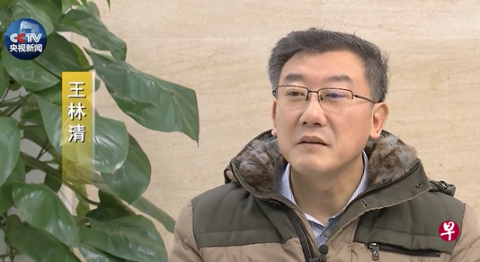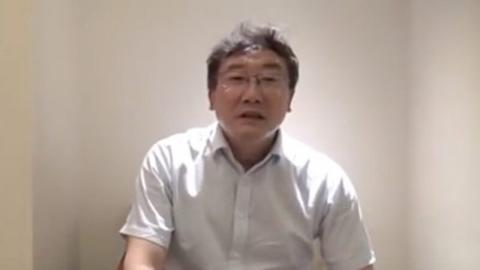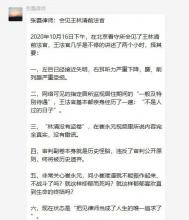Chinese Supreme Court judge sentenced to 14 years imprisonment.
Chinese Supreme Court judge Wang Linqing (王林清), the center of much drama over the last three years that have touched upon key issues in China since the rise of Xi Jinping, has been sentenced to 14 years of imprisonment.
Wang’s case received some attention when he disappeared from public view at the very end of December 2018, after a number of videos circulated online claiming corruption within the Supreme Court, and it received even more attention when he reappeared on State/Party-TV in a forced TV confession just months later, before again disappearing.

A still from Wang's forced TV confession on Chinese State/Party TV
It would be more than a year and a half after disappearing that China’s Supreme Court judge was allowed to meet with a lawyer, long after his disappearance into China’s system for secret detention – RSDL or ‘residential surveillance at a designated location’ had ended, and he had been formally arrested. When he did meet his lawyer, after much delay, Zhang Lei, on 16 October 2020, he said that “to meet with a lawyer is my only life pursuit now” and described the custodial system "not fit for humans".
Last Friday (7 May) Wang was found guilty on both charges against him by the Beijing Second Intermediate Court, and given 10 years of imprisonment for “bribery” and five years for “illegally obtaining state secrets”, with court combining them to a 14 year sentence, along with a one million CNY fine. Counting the time served in RDSL (2 days in RSDL discounts 1 day of sentencing) and in pre-trial detention (1 day discounts 1 day of sentencing), Wang is set for release sometime around early 2033.
A dramatic fall, online allegations, and pre-recorded videos
On 26 December, 2018, an Intellectual - and former CCTV presenter - Cui Yongyuan, exposed on his weibo (China’s Twitter) that there was thief inside the Supreme Court, and that files related to a 100 billion CNY mine ownership case had been missing for two years. The post brought great public attention. The very next day, the Supreme Court responded that the allegation was merely a rumour. It was clear Cui was not levelling his allegation against Wang, but against the court.
On 29 December, 2018, Cui revealed further evidence through weibo, pointing out the file had been stolen from a judge’s office, and that the judge who handled the mineral case was Wang. Cui also released two photos that looked like the missing files. The Supreme Court in response admitted that the content shown in the photos matched the copy of the claimed file and that they would start an investigation.
The next day, 30 December, “China Times” received and released a video, a video recorded by Wang himself. In the video, Wang said he made the video for self-protection and released it as evidence in case something were to happen to him. In the video, Wang exposed two cases of similar nature, one that was about a contract dispute starting back in 2003, and how relevant files had all gone missing as he was about to write a judgment.

One of Wang's self-recorded protection videos
On January 2, 2019, another of Wang’s self-recorded videos leaked online. In this video, Wang talked about another case that he was involved in back in 2012, which may be related to his current situation. The case concerned the infringement of property rights worth billions of CNY. When Wang handled the case, the president of the Supreme People's Court’s Supervision Bureau would call Wang twice a day to seek reports on the case, and make clear that a decision needed to be taken to benefit one of the specific parties to the case. Wang refused to do so and also reported that this very same party had tried to bribe him. After Wang delivered an unfavourable outcome to the same party, Wang received a threat, saying he would have trouble in the future.
Wang’s re-appearance “confessing” on State/Party TV
Wang was last seen leaving his office at the Supreme Court on 3 January 2019. He has not been seen since. On 9 January Cui, the intellectual and former CCTV presenter who started his dramatic fall said he had spoken to Wang on the phone and that he sounded fine but was unable to meet. After that, nothing more was heard.
Until.
On 22 February, Wang appeared in a staged and quite obviously forced TV confession, aired both on China’s premier domestic news channel, CCTV13, on the Focus on (共同关注) programme, but also around the world on the international Chinese language channel CCTV4, a video captured and saved by Safeguard Defenders. His forced TV confession was the 50th identified by Safeguard Defenders on CCTV since Xi Jinping came to power. In the video, Wang simply admits to having stolen the file, claiming he did so because he wanted to ensure he could continue to handle the case.
After this video, he disappeared, and even though Safeguard Defenders assumed he would have been placed into the Party’s own extra-legal system for secret detention, Liuzhi, it turns out he was placed into RSDL. In his meetings with his lawyer the length of his stay inside RSDL is not made clear, but it is likely he spent up to half a year inside the system, locked away in solitary confinement at an undisclosed and secret location.

As is typical in China’s forced TV confessions, having the individual assume guilt is not always enough, and the post from Cui was seemingly made to put all blame squarely on Wang, not the Court itself or others, and to remove any remaining support for Wang.
Trial and verdict
Wang’s trial, part of it held behind closed doors, took place on 26 and 27 October 2021, and it would take until 7 May 2022 until the verdict was finally delivered. In the verdict it states Wang received over 20 million CNY in bribes from companies related to the cases mentioned in Wang’s self-defence videos, and that he stole case files from an ongoing case, where five of the files are deemed state secrets.
At the time of his trial he had been held for more than two and half years, and by the time of his verdict, almost three and a half years. When meeting his lawyer, after years in detention, Wang expressed his concern for Cui’s well-being; “Will Cui be able to cheer up again? Will he stay depressed until the end of his life?”
Where Wang will serve his sentence remains unknown.